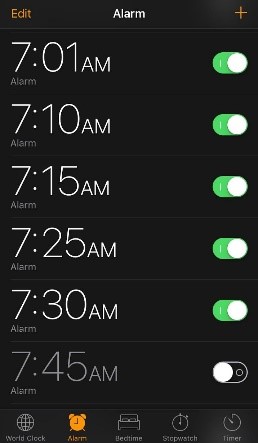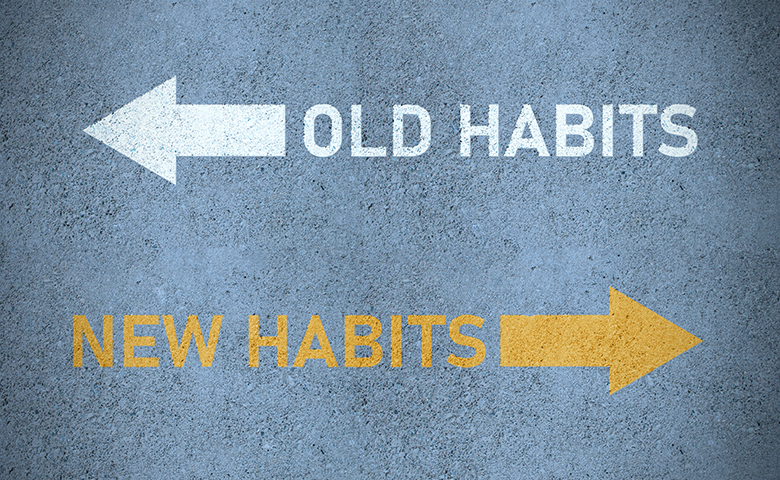Many people start to think about their habits, good or bad, in the days before and after New Year’s. It’s the perfect time to consider the positive habits you’d like to adopt in order to propel yourself forward, as well as the negative habits that you’d like to shed because they’re holding you back.
Bad habits include things within a person that are so deep-rooted and happen so often that they are considered to be part of their personality. “She’s a smoker”, “He’s lazy” or “She’s reckless” are a few phrases that describe a person based on their habits. The good news is that these are destructive habits and they are manageable. Here are a few examples of common destructive habits that will impact you in the workplace.
Hitting the snooze button
As explained in our How to Make Habits Stick guide, the habit loop (1. Cue 2. Routine 3. Reward) describes how the destructive habit of hitting the snooze button is rewarded by nine more minutes of sleep. For some people, the routine of hitting the snooze button is planned (they set multiple alarms to act as snooze buttons after they disengage the first).

For others, the routine is so subconscious that they don’t even realize they’re doing it. This habit seems innocent enough but the repetitive alarms actually disrupt sleep quality and leave you feeling groggier than if you slept straight through for an extra ten minutes. There’s not enough time after you hit the snooze button to allow your body to fall back into a deep sleep, so ultimately, it messes with your internal body clock. And being fatigued can impact your safety and productivity in the workplace.
Constantly checking the phone
Some people use their cell phones as alarm clocks, so the next disruptive habit can be hard to avoid when it’s the very thing you need to pick up in order to disengage the alarm. It also makes it hard to avoid checking your phone as soon as you wake up—the notifications on your phone are begging to be checked. Unfortunately, those early morning phone checks fuel the habit for the rest of the day. On average, Americans check their phones at least 96 times per day, or once every ten minutes. The most common thing that people use their phones for is a data-driven app or internet access. Time spent on the internet/apps on your phone can be all-consuming—some people almost forget about their work or are so distracted by what’s on their phone that they aren’t present in conversations people are having with them. It can also lead to divided attention throughout the day and work completed less effectively than normal.
Surfing the internet
As discussed in our Focus on Distraction to Improve Safety Outcomes, directed attention fatigue is the phenomenon that occurs when the brain concentrates on one task for too long, subsequently becoming susceptible to distractions. Essentially, you become too tired to perform regular tasks. The most common distraction in the workplace is the internet because it doesn’t require much thought to use; ironically, people can fatigue their brain by spending too much time focusing on their phone and all they have the capacity for is spending more time on their phone. It can also alter your time perception. A study done at the University of Kent showed that participants underestimated the amount of time that passed when they were looking at internet-related images. Losing time can greatly impact your day—and not in a good way.
Skipping meals
One thing that impacts the human factors that control these destructive habits is not having the right food to fuel your brain. We’ve heard for years that breakfast is the most important meal of the day, but have you ever thought about why? Skipping breakfast can cause you to be more susceptible to fatigue, and distraction, and impact your reaction time. A study by Alexa Hoyland, Louise Dye, and Clare L Lawton revealed: “…that skipping breakfast or eating a low-quality breakfast have a negative effect on cognitive function, thus resulting in a decline in brain excitability, the emergence of a slow response and a reduction in attention.” Skipping lunch can have the same effect.
This list of hindering behaviors is just the tip of the scale—there are a number of destructive habits that can impede your work day. Being conscious of these habits can help eliminate them. One of the most self-destructive habits people have is talking about what they’re going to accomplish instead of actually accomplishing it—this is a notable trait for New Year’s resolutions. If there isn’t any follow-through, there’s no point talking about it. Check out our free resources if you’re struggling to work on your habits or want to help someone else in working on their habits. Happy New Year!

